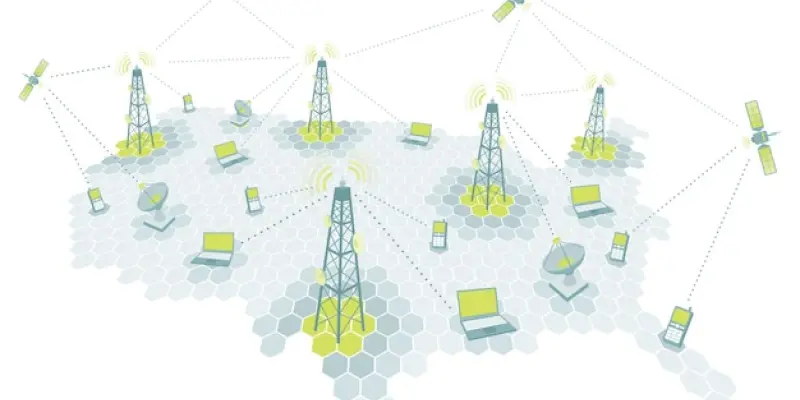The strategic collaboration between MasOrange and Vodafone Spain marks a significant moment in the Spanish telecommunications industry with the launch of FiberCo. This ambitious project, which aims to create the nation’s largest independent fiber optic company, sets the stage for transformative changes across Spain’s telecom sector. Signed in January, the agreement highlights MasOrange’s commitment to solidifying its financial foundation while optimizing its capital structure. The scale of the investment involved, totaling 11 billion euros, is a testament to the serious intent behind FiberCo. MasOrange has secured 6.25 billion euros in financing, with an additional 4.7 billion euros allocated specifically for FiberCo’s infrastructure. These efforts are designed to lower MasOrange’s average cost of debt, extend debt maturity, and enhance strategic capacities. The collaborative venture, with its substantial economic backing and comprehensive network integration, promises to redefine connectivity for millions of users across Spain. It heralds an era of improved services, broader reach, and a modernized telecom landscape.
Strategic Collaboration and Financial Foundations
The FiberCo initiative is notable not only for its ambition but also for the strategic framework that underpins its establishment. By bringing together over 12 million real estate units from both MasOrange and Vodafone Spain, FiberCo aims to build an extensive, high-capacity network capable of delivering enhanced connectivity services. This endeavor comes as a response to the growing demand for high-speed internet and advanced communication solutions. A multi-tier ownership structure forms the backbone of FiberCo’s corporate governance, with MasOrange holding a controlling 50% stake, Vodafone Spain having a 10% interest, and a financial investor owning the remaining 40%. This diversified ownership model ensures a balanced distribution of power and interests. It also highlights the importance of collaborative financial support for the venture’s success. In a significant vote of confidence, approximately 20 banks have participated in structuring the 4.7 billion euros raised specifically for FiberCo, aiming for an investment-grade rating. This financial backing underscores optimism in Spain’s telecom infrastructure marketplace and cements FiberCo’s robust financial foundation. The establishment and growth of FiberCo are thus well-supported, creating room for MasOrange to focus on strategic deleveraging. A notable aspect of the agreement is the strategic investment strategy that accompanies it. MasOrange has earmarked 4 billion euros for investment specifically within Spain, concentrating on expanding fiber optic networks and added services in response to technological trends and customer expectations. This investment is part of a broader initiative by MasOrange to remain at the forefront of technological advancement and maintain a leading competitive position in Spain’s telecommunications space. The collaboration with Vodafone Spain is not only about expanding infrastructure but also about fostering innovation and tapping into new market opportunities. By doing so, MasOrange aims to enhance its service offerings and improve customer satisfaction. This strategic expansion effort also aligns with its goals to streamline operations and optimize resource availability. Together, these actions reflect a commitment to leadership in connectivity advancements, reinforcing MasOrange’s capability to shape the future of telecom in Spain.
Technological Innovations and Network Advancements
MasOrange’s efforts in advancing its technological capabilities are evident through its recent initiatives in network technology. Most notable is the deployment of Spain’s first 5G Advanced (5G-A) network in Seville, which sets a new standard for telecom infrastructure in the country. This cutting-edge network adopts a series of nodes operating on both mid and low-frequency bands, alongside a 26 GHz spectrum and a broad 3.5 GHz coverage. Developed in collaboration with Huawei, the 5G-A network introduces significant improvements over the traditional 5G Standalone (SA) version. It brings enhanced connectivity, network-based sensing, enriched voice services, and a broader spectrum of Internet of Things (IoT) applications. Furthermore, this advanced network facilitates drone and balloon communications, effectively extending coverage to remote areas and ensuring reliable connections during critical situations such as emergencies. With private network support and built-in artificial intelligence capabilities, the 5G-A deployment demonstrates MasOrange’s foresight in embracing new technologies that transform telecommunications.
Further enhancing its technological prowess, MasOrange has also partnered with Ericsson to modernize mobile network infrastructure through the integration of Open RAN (O-RAN) technology. This approach heralds a shift toward open, software-defined network architectures, promising increased operational efficiency and adaptability for new service rollouts. Adopting O-RAN is expected to drive down costs significantly while also elevating customer experience levels. It creates opportunities for third-party service providers to innovate, mirroring MasOrange’s commitment to technological adaptability and a forward-thinking strategy. The initiative underlines the company’s ambition to not only keep pace with but also to lead evolutions in telecom infrastructure. By prioritizing network efficiency and service flexibility, MasOrange positions itself to better meet future communication needs and facilitate a dynamic and responsive telecom environment. These advancements collectively embody MasOrange’s strategy of continuous innovation, ensuring the company not only leads industry standards but sets new benchmarks in technological development.
Future Impact and Industry Positioning
The strategic alliance between MasOrange and Vodafone Spain is poised to change the Spanish telecommunications landscape with the introduction of FiberCo. This ambitious undertaking aims to create Spain’s largest independent fiber optic company, paving the way for transformative effects in the telecom sector. Finalized in January, the agreement underscores MasOrange’s dedication to strengthening its financial base and optimizing its capital resources. The investment scale, set at 11 billion euros, underscores the seriousness of FiberCo’s mission. MasOrange has secured 6.25 billion euros in financing while dedicating 4.7 billion euros specifically to FiberCo’s infrastructure. These measures aim to reduce MasOrange’s average cost of debt, extend debt terms, and bolster strategic capacities. This joint venture, with substantial financial backing and network integration, is set to redefine connectivity for millions in Spain. It heralds an era of enhanced services, wider reach, and a modernized telecom scene, promising improved user experiences across the nation.

